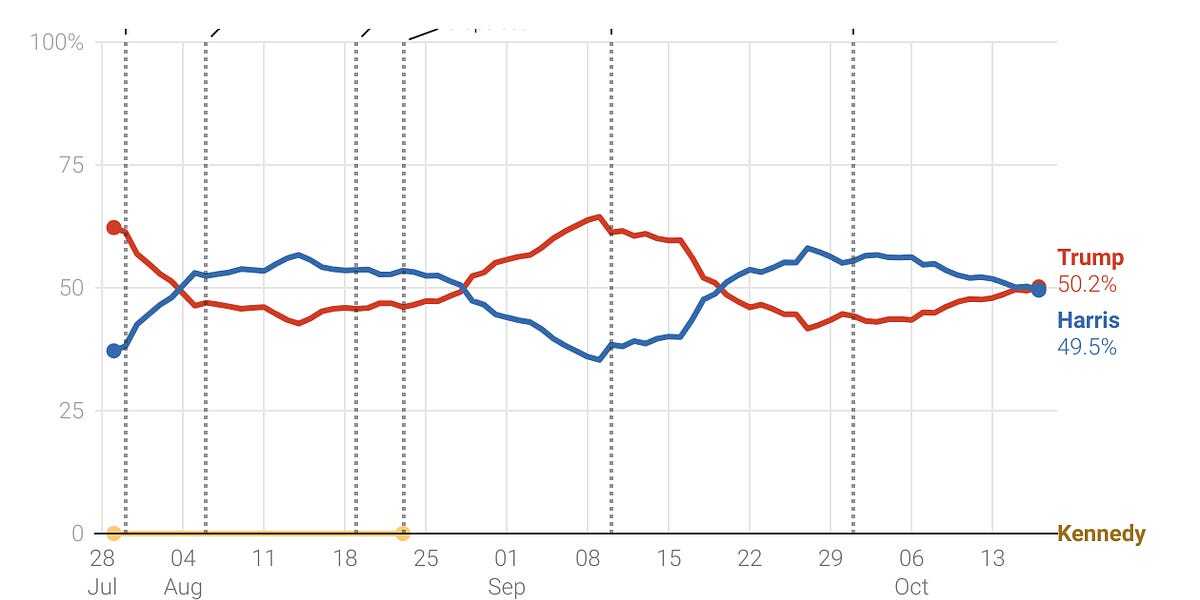Fair enough, but to be clear, the origin of latine isn’t from within the US. It migrated from Spanish-speaking countries (largely within the demographics we talked about earlier) as a corrective for latinx. I think you’ll find most people in the United States have not seen “latine” used before. It’s used more outside of the US than within it.
- 6 Posts
- 522 Comments
You should look up what “subtext” means.
The amount of white democrats that have as a subtext to their commentary about the Hispanic vote a “I hope Trump puts you in a camp and then kicks you out of the country for not voting for Harris” sentiment says a lot about the democrats.
Edit: angry white democrats downvoting. 🤣
Latine is more sensical in Spanish. You’re correct that it’s used more by young, urban, and non-male people. If by “out of touch” you mean it doesn’t cater to Latino men over 30, you may be right. If being “in touch” means exclusively catering to older Latino men, I don’t think that’s a long-term winning strategy. More inclusive Spanish along with non-inclusive Spanish can generally coexist. I don’t think it needs to be a universal decree.
Reminds me of that comedy video with the dude in a hospital bed who can’t decide between having a surgeon or a clown do his life-saving surgery (spoiler: he chooses the clown because he’s something different and he felt hospitals need that).
Hey @jordanlund@lemmy.world, you seem like someone that might have a good perspective on a question I have. While I’ve always noticed a habit of people to down vote news they don’t like on Lemmy, I feel as though there has been a lot more of this occurring in the last, say, two weeks around election news.
Anything that seems to indicate bad news for Harris or is critical of democrats tends to get rapidly buried, often with little engagement. I worry this is symptomatic of a broader denialism on the left/Harris wing, and that it might lead to another election where people are caught by surprise by something that was a very plausible possibility the whole time.
Since you see a lot more posts than I do week in and week out, does that phenomenon seem to be intensifying over the last week or two, or have I just been noticing it more and it’s always been happening?
Hopefully.
He makes a pretty clear case both for the idea that “momentum” is kind of meaningless, but also that Trump slowly gaining for the last 30 days is not. Part of what pushed it over the line (Silver is quick to point out that 49.8 and 50.2 is basically meaningless like the difference between a 49th and 50th birthday; we like round numbers) is the Fox News poll.
As he demonstrates, there is no detectable right-wing bias in Fox News polling despite the obvious bias of their news reporting. I can’t speak to the others, but I’m not ready to dismiss all polls based on the political identification of the organization, if the polling is of high quality.
My gut tells me Trump is going to pull this out somehow. But, then again, my gut literally has shit for brains.

 0·8 months ago
0·8 months agoJust to be clear, saying you have humility was intended as a compliment.
College graduates, white people, suburban, and affluent people are four methods of categorizing people. One can belong to one, two, three, or all four of these groups. When we examine overall trends, it doesn’t make sense to only focus on a narrow time period, like two years from the past. Instead, if we want to understand trend projections, we need a longer range of data, ideally looking from 2014 to 2024. A smaller set of data can be misleading. For instance, if you looked at suicide rates between 1998 and 1999 in the U.S., you’d see a drop. But if you zoomed out from 1980 to the near-present, you’d see a clear and alarming upward trend. Focusing too narrowly risks missing the bigger picture. (The inverse is also true: if you looked at democrat’s base over 200 years, you’d be including when the were the party of slavers.)
Over the last decade, we’ve seen a notable shift in the Democratic base toward white, affluent, and college-educated voters. Traditionally, Democrats were the party of the working class and people of color. However, support among those groups has been slipping, while wealthy, suburban, and educated voters—especially in urban areas—have increasingly embraced the Democratic Party, particularly on cultural and social issues. This shift became more pronounced during and after Trump’s presidency, as many educated, affluent voters were turned off by his populist, anti-intellectual rhetoric.
Looking ahead, the trend seems to be one where Democrats rely more heavily on white, college-educated, and affluent voters, while their historical support from working-class voters and people of color continues to decline. Democrats will likely gain ground in cities and suburbs where these voters are concentrated, but struggle in rural and less affluent areas. This is a significant realignment for the party, which might face challenges reconciling the economic interests of these affluent voters with the needs of its traditional base, even as social and cultural issues increasingly become the glue holding this new coalition together.
Again, that’s not necessarily a problem in terms of the ability to get democrats elected. But it does present an unfortunate trend if you are concerned with your party representing those demographics. It also requires enough of the shifting composition to make up for the other declines in voters. Given how close almost all elections are these days, that’s no guarantee. And, as I noted, it also might create issues where democratic policies and platforms may need to prioritize one group of supporters over the other – though, arguably, that’s already been occurring, and seems like part of the reason for the shifting composition of the base.

 0·8 months ago
0·8 months agoITT: white democrats having a political identity crisis.

 0·8 months ago
0·8 months agoHey, all else aside, I really appreciate you for constructively adding to the conversation and being so humble. In a post that took me a while to research and write that seemingly induced a lot of denialist-downvotes, it is refreshing to at least see someone willing to listen and think about it.

 0·8 months ago
0·8 months agoThanks for sharing that source. While it shows a small decline in the Democrats’ lead among white college graduates, this is largely a blip compared to broader and longitudinal trends if you extend this further and bring it current. The rise of affluent, college-educated white voters in the Democratic base is well-documented, including in the sources I originally mentioned as well as Brookings, Politico, and Pew itself. This slight decline reflects specific dynamics in the 2020 election, such as a shift in voter focus toward economic issues and populist appeals. Overall, affluent, educated, and suburban whites continue to strengthen their role in the party, confirming the growing influence of white affluence in the Democratic coalition.
It’s strange to me that this fact is so upsetting to people. It’s not necessarily a bad thing, but it is a well-documented change emerging in the demographic base of democratic support.
Edit: look at non-college-graduate Hispanic support even in this small snapshot. It’s pretty wild, and it’s something democrats will have to contend with eventually. Ideally once Trump is out of the picture.

 0·8 months ago
0·8 months agoI’m frustrated by having to agree with you. 😁

 0·8 months ago
0·8 months agoTruth. To be clear, I’m not trying to dismiss that fact. But it’s important to realize this is a “men” problem, not exclusively or especially a “black men” problem. There’s more going on here in terms of political realignment.
To be clear, black voters still vote overwhelmingly democratic, but it’s continued to shift over the last eight years, with Trump continually picking up more and more POC votes. He doubled black support, and the Hispanic vote is the closest to even it’s ever been – Harris still leads by 14 points in that demographic, but that’s a big change that is part of a broader trend.

 0·8 months ago
0·8 months agoYes, obviously. The point is that the democratic party has consistently become more and more the party of white, affluent, and college educated people. That has not historically been the case, and democrats seem to get mad when people point out that their base is shifting.
And the super wealthy are like their own bizarro class. It’s quite easy to list off names of billionaire democratic supporters as well. I am talking more about Tesla owners (before Musk took the mask off) than the owner of Tesla, if that makes sense.

 0·8 months ago
0·8 months agoCongratulations. You pushed a button.

 0·8 months ago
0·8 months agoFucking. LOL.

 0·8 months ago
0·8 months agoI’ve read your posts before, bro. You’re a clown shoe. My post, this article, and Obama’s comments have nothing to do with you.

 0·8 months ago
0·8 months agoObama is full of shit, and this basically seems racist to me. The issue isn’t gender, but rather the Democrats’ growing disconnect with working-class voters of color. Harris is actually performing better than Biden did with Black voters, but that doesn’t change the broader trend: the Democratic Party is steadily losing support among people of color, particularly those without college degrees. Instead of addressing economic and social concerns that matter to these communities, Democrats seem to be pushing them away, allowing Republicans to gain ground.
This trend is most evident in the party’s shift toward becoming the choice of wealthy, college-educated white voters. As polarization based on education deepens, Democrats are doing better with white voters who have college degrees, but they’re struggling to maintain their traditional base. Black, Hispanic, and working-class voters without degrees are feeling left behind. Instead of focusing on real issues like wages, jobs, and education, Democrats seem more focused on elite, academic-driven policies that fail to resonate with these groups.
What we’re seeing is a realignment where the Democrats are slowly becoming the party of affluent, educated white voters, while Republicans are making gains with working-class and nonwhite voters. The erosion of Democratic support among these key constituencies isn’t because voters don’t want to back a woman—it’s because the party has lost touch with the issues that matter to them. If this continues, the demographic foundations that have long been assumed to be Democratic strongholds could shift in the GOP’s favor.




Totally agree. I find this one much less forced. Hopefully it doesn’t get taken up in the culture wars. It would just be nice to have an accepted neuter term for… latino/as.